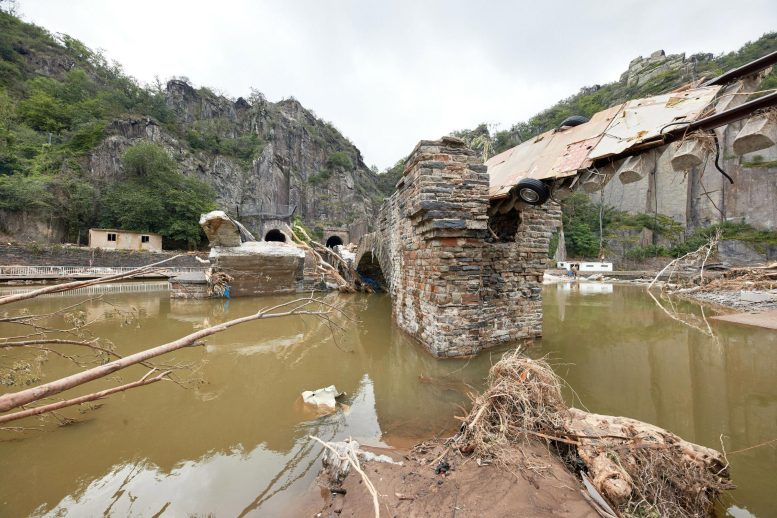
New research challenges the notion that self-deception about personal behavior is the main driver behind climate change denial.
Do climate change deniers bend the facts to avoid having to modify their environmentally harmful behavior? Researchers from the University of Bonn and the Institute of Labor Economics (IZA) ran an online experiment involving 4,000 US adults, and found no evidence to support this idea. The authors of the study were themselves surprised by the results. Whether they are good or bad news for the fight against global heating remains to be seen. The study is being published in the journal Nature Climate Change.
A surprisingly large number of people still downplay the impact of climate change or deny that it is primarily a product of human activity. But why? One hypothesis is that these misconceptions are rooted in a specific form of self-deception, namely that people simply find it easier to live with their own climate failings if they do not believe that things will actually get all that bad. “We call this thought process ‘motivated reasoning,’” says Professor Florian Zimmermann, an economist at the University of Bonn and Research Director at IZA.
Motivated Reasoning in Action
Motivated reasoning helps us to justify our behavior. For instance, someone who flies off on holiday several times a year can give themselves the excuse that the plane would still be taking off without them, or that just one flight will not make any difference, or—more to the point—that nobody has proven the existence of human-made climate change anyway. All these patterns of argument are examples of motivated reasoning. Bending the facts until it allows us to maintain a positive image of ourselves while maintaining our harmful behavior.

More drought, more hot weather, more torrential rain as in the picture depicting the Ahr valley flood in Germany in 2021: despite these signs, many people question the existence of climate change or refuse to believe that it is caused primarily by human activity. Credit: Volker Lannert/University of Bonn
Self-Deception To Preserve a Positive Self-Image
But what role does this form of self-deception play in how people think about climate change? Previously, there had been little scientific evidence produced to answer the question. The latest study has now closed this knowledge gap—and has thrown up some unexpected results. Zimmermann and his colleague Lasse Stötzer ran a series of online experiments, using a representative sample of 4,000 US adults.
At the center of the experiments was a donation worth $20. Participants were allocated at random to one of two groups. The members of the first group were able to split the $20 between two organizations, both of which were committed to combating climate change. By contrast, those in the second group could decide to keep the $20 for themselves instead of giving it away and would then actually receive the money at the end. “Anyone keeping hold of the donation needs to justify it to themselves,” says Zimmermann, who is also a member of the ECONtribute Cluster of Excellence, the Collaborative Research Center Transregio 224 and the Transdisciplinary Research Area “Individuals & Societies” at the University of Bonn. “One way to do that is to deny the existence of climate change.”
As it happened, nearly half of those in the second group decided to hold on to the money. The researchers now wanted to know whether these individuals would justify their decision retrospectively by repudiating climate change. The two groups had been put together at random. Without “motivated reasoning,” therefore, they should essentially share a similar attitude to human-made global heating. If those who kept the money for themselves justified their actions through self-deception, however, then their group should exhibit greater doubt over climate change. “Yet we didn’t see any sign of that effect,” Zimmermann reveals.
Political Identity and Climate Change Denial
This finding was also borne out in two further experiments. “In other words, our study didn’t give us any indications that the widespread misconceptions regarding climate change are due to this kind of self-deception,” says Zimmermann, summing up his work. On the face of it, this is good news for policymakers, because the results could mean that it is indeed possible to correct climate change misconceptions, simply by providing comprehensive information. If people are bending reality, by contrast, then this approach is very much a non-starter.
Zimmermann advises to be cautious, however: “Our data does reveal some indications of a variant of motivated reasoning, specifically that denying the existence of human-made global heating forms part of the political identity of certain groups of people.” Put another way, some people may to an extent define themselves by the very fact that they do not believe in climate change. As far as they are concerned, this way of thinking is an important trait that sets them apart from other political groups, and thus they are likely to simply not care what researchers have to say on the topic.
Reference: “A representative survey experiment of motivated climate change denial” by Lasse S. Stoetzer, and Florian Zimmermann, 2 February 2024, Nature Climate Change.
DOI: 10.1038/s41558-023-01910-2
The University of Bonn and the Institute on Behaviour and Inequality (briq) were involved in the study. briq is now part of the Institute of Labor Economics (IZA). The work was funded by the German Research Foundation (DFG).









I think a common misconception is that presuming someone pushing back on the climate change agenda is a “denier”.
No, many of us know the climate is changing. The Earth is a big living organism and does not exist as a static structure.
Many “deniers” differ in the opinions humans are the sole cause and that we can impact the rate of change in any meaningful way.
Furthermore we also dont give anyone the authority, nor does God, to tell us how to live, eat, or exist.
We also see the hypocrisy of the ones trying to force changes in the name of “climate change”.
These people still fly in private jets, eat fancy dinners, buy beachfront property, and pollute at many times the rate of an equivalent regular person.
If climate change really is the threat they claim, wouldnt they be practicing what they preach?
Hell most of the people pushing the climate change agenda are guilty of the same claims this article makes on so called “deniers”!!
You have got to be kidding me. The “deniers” bend the facts? The data that the climatologists use is short, inaccurate, and incomplete. Their models are a joke. There seems to be this belief that just because it’s a mathematical model, it’s somehow infallible. Anyone who is objective about mathematical models, especially those not backed by solid data and a solid theoretical foundation, knows that they are notoriously unstable an inaccurate. Add to that the fact that the worst case scenario forecasts of these suspect models are what make it into print. Also, nowhere do you see any kind of realistic estimates on the economic cost of influencing climate change. Does it make sense to spend ten trillion dollars to offset a trillion dollars worth of damage due to climate change? No one knows because no good studies have been done on this. The so-called “deniers” simply want researchers to be objective, not stooges for a political agenda.
I agree with the above comments. Some of the problems from the climate cultists is that they will not engage in data-backed scientific debate. Most “debates” I’ve seen devolve into ad hominem attacks from the cultists rather than discussing the data. “The science is settled” is their argument and no disagreement can be allowed. It’s curious that only in climatology is the “science settled”. Other fields of study often announce new findings that may change their understanding of their field- see cosmology and astronomy. Climate models don’t work, the executive summaries of the IPCC reports sometimes directly contradict the actual science findings located within the chapters of the report, cultists actively work to prevent “non-conforming” articles from being published in science journals (and boast about it), and remember the e-mail “Climategate”. I don’t argue that climate doesn’t change, but it’s been changing since since the Earth was formed. The problem the cultists have is that their behaviour is so corrupt.
Why did Michael Mann, father of the “hockey stick” graph, decline to provide access to his original data and instead dropped the slander lawsuit he filed? Because his data would not support his conclusions and he knew it? Free the data!
This is mildly interesting. The the hypothesis is absurd, but a common assumption, and they did try to test it. Their partial conclusion “that denying the existence of human-made global heating forms part of the political identity of certain groups of people” is ironic when the study obviously starts from the perspective of a certain group politically identifying with the opposite conclusion.
Personally, I don’t politically identify with either position, as I see climate change as a scientific issue, an engineering and technological concern, not a political one. I don’t identify as a “denier”, though I’ve been called that many times. It is nice to see a study questioning the usual assumption, that anyone skeptical or asking questions or reaching an opposing conclusion must be selfishly irrational. That may seem obviously false, but there are religious adherents to the theory who see questioning as heresy.
I was impressed by the impartial reasoning of the people in the study, until I read it. 15% to 17% of the people initially believed zero scientists doubt human-made climate change. Not one? The delving into Republican vs. Democrat politics is America-centric and more of a political focus-group, but they were less divergent in perspective than I’d expect (60% vs. 39%).
I would be interested in criticism of this study. For example, maybe keeping the $20 instead of donating represents low trust in the two climate nonprofit organizations. Maybe one video was more convincing than the other. Funding was done through the DFG, a German-government funded science scientific research organization, which could have pro-industry leanings, but I didn’t see that in the methodology. The study seems well done, but that could be my bias.
“… is ironic when the study obviously starts from the perspective of a certain group politically identifying with the opposite conclusion.”
Yes, the unstated assumption is that there is no validity to objections of skeptics and that the one and only correct position is that “alarmists know the truth, and those who don’t accept that are irrational.” It is evident, to me, that the researchers are biased when they choose to use “deniers” (without definition), which derives from the derogatory term “Holocaust Deniers.” Considering that, the German-government funding organization is certain to be familiar with the Holocaust. Their choice of words cannot be attributed to ignorance, naivete, or carelessness. It is almost certainly intended. They have no shame considering that the term “Holocaust Deniers” almost certainly traces back to Germans who didn’t want to take responsibility for what happened.
It has been my experience in life that things are rarely black and white. Both sides of the claims probably have errors. Trying to make it binary, when analog is probably a better fit, speaks to the alarmists being politically motivated instead of being driven by just facts.
While I’m not a ‘certified’ climatologist, and most practicing in the field aren’t, I feel quite comfortable debating any self-described climatologist because there are simply so many problems with the hypothesis of Anthropogenic Global Warming that I doubt that an open discussion on a level-playing field would find alarmists to be compelling. Were it not for the ‘news’ media shoring up the meme, more people would realize just how shaky the foundation of Anthropogenic Global Warming is.
Their initial biased assumptions were totally absurd. I’m impressed they decided to test a biased assumption, found that was wrong, and even published it. I admire the dispassionate and practical German mindset I think informed the study.
True, without the media portraying every “drought, hot weather, torrential rain” as if it had never happened before and must be human-caused climate change, then the theory would be relegated to the same panic level as Global Dimming.
Seeing scientific truth as analog, instead of binary…I like that metaphor a lot! The alarmist certainty is unscientific arrogance, but I think the history of science shows our scientific continuing mission is to become less wrong.
Simple; the truth hurts.It is uncomfortable, especially when it concerns our profligate waste of energy.
Fact; CO2 is a greenhouse gas.
Fact; we produce CO2 when we burn stuff for energy.
Fact3; CO2 production and our human population have increased in lock-step exponentially since 1945-1950.
Fact 4; the radiative forcing curve of CO2 seems to lessen as the amount of atmospheric CO2 increases BUT that reduction occurs too late in the curve to prevent Anthropogenic Global Heating from stop our average global temperature from increasing by 3 to 5 degrees C.
Fact 5; ice melts at temperatures above 0 degrees C. Ice provides a reservoir of water for around 3 billion people in three countries that have nuclear weapons and far too many people for comfortable political management.
Fact 6; sea-level rise is occurring and will continue for a very long time, so perhaps it is appropriate for those refusing reality to bury their heads in a waterfront sand-dune.
“Fact; CO2 is a greenhouse gas.”
Fact; CO2 is but one of several forcing variables involved in complex feedback loops that tend to be negative; were they positive, the system would continue inexorably to become like Mercury or Venus. The fact that it hasn’t, despite having been much warmer several times in the past, is evidence that the feedback loops are on net, negative.
Cult denier not climate denier. Conformity is forced in a cult.
Totally agree with Clyde Spencer’s summation.
Also,
looks like the authors of this article confuse “belief” with weighing up scientific evidence and coming up with one’s own ability (using scientific evidence/logic) to come to conclusion about the topic on AGW and veracity of modelling. My conclusion and not “belief” is that it’s not supported by the evidence (e.g. accurately measured/vetted/QA’d data).
Plus, I suggest, it has never been conclusively demonstrated that CO2 causes, or is instrumental in AGW or catastrophic global warming. Please refer to the many studies that show past earth’s climate, where CO2 increases can lag temperature increases by 800-1,000 years. In fact the data suggests in general there is no well-defined link/correlation.
How many ppm make up the earth’s atmosphere!?
Suggest, Water vapour and clouds (convection, the sun, cosmic rays, ENSO, earths orbit, movement of earth through galactic arms, …) trump CO2 for greenhouse gas effects. The IPCC modelling don’t take all these into account either.
How accurate are models compared to actual temperature measurements? Pretty poor record so far. We’re supposed to “believe” they can accurately forecast future earth’s climate for, what 30+ or 100+ years !?
The CO2 evangelists keep coming up with reasons to prop up their pet cause of AGW.
Man-made CO2 emissions compared to natural are approx. 3% of total. So why even blame the man-made CO2 emissions on climate change.
Climate changes all the time – no rational person (e.g. properly high school educated adult, say) looking at the earth’s history would deny that. But it is a real leap of “faith” (which the real deniers of the facts are doing) to say man-made CO2 emissions are THE reason for the bogey-man of AGW.
Another issue is the average earth temperature – which doesn’t have any sensible scientific meaning.
Who are the real deniers/”believers”?
It is an open question which the net independent variable is in the demonstrated correlation between temperature and CO2. That is, is CO2 causing an increase in temperature or are increasing temperatures causing a net increase in CO2? One of the apparent strongest arguments for fossil fuels driving the increase in atmospheric CO2 is the measured change in the ratio of light (12C) CO2 to heavy (13C) CO2. However, it seems that no one has looked carefully at the process of isotopic fractionation when increasing global temperatures preferentially out-gas light CO2 from the oceans, and warming Winters similarly increase the light CO2 from dormant vegetation respiring, particularly Boreal trees. Lastly, the melting of permafrost is allowing organic detritus to be decomposed at higher rates, and the detritus is releasing CO2 not all that different from fossil fuels. The people getting paid big bucks to understand the Earth system have so far largely ignored the issue of isotopic fractionation.
Ive a different take. Basically I dont care whether humans cause or dont cause climate change, because the mefhods used by warmists *don’t halt climate change.*
Literally every molecule reduced by the west has been more than offset by China, India, and the rising emissions of nonwestwern cultures. You can attribute it to their deservedness (if so why not the west), their need for development (if so why not the west), their populousness (if so you wont reduce emisskions), but there is really no case in which climate methods will resolve this issue.
The results in the west risk dangers to humans there, too. Tech is not keeping up with the profound cuts necessary. People will die of them.
So why am I negative on climate methods? They. Don’t. Work. Who cares if they’re right, if the solution is in all events wrong?
It is what it is we all love to argue or not, have no children doesn’t care.